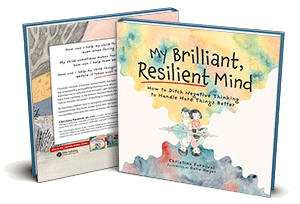The Baggage & Motherhood Guest Writer’s Series gives a space for moms around the world to share their story of what life has thrown their way and how it has impacted them in their role as a Mom. This post by Kristen Gardiner explores perinatal depression, the clash of her expectations of what motherhood would look like versus her reality, and seeking help through medicine and therapy. Her experience is unfortunately one that many women go through. We hope you know you’re not alone and there is support!
All of the posts in this series touch on the real life struggles of bringing your “stuff” with you to your most important job: Motherhood.
I went into motherhood expecting things to be a certain way. Yes, it would be hard, but I could handle it. I never expected that my mental health would change the way that it did and complicate the experience of motherhood so profoundly.
I felt a significant change in my moods and ability to cope with the stresses of life during my first pregnancy, especially as I began the second trimester. The only thing I had the energy to do was lay down and watch reruns of Law and Order. I could barely bring myself to take a shower and get dressed. The simplest tasks seemed monumental. I would cry at the thought of having to get dressed, having to go to work, and having to go grocery shopping. I began to dread almost every single thing in my life. I would just repeat, “I can’t do this,” almost all day long. The most frustrating part is that I knew I didn’t want to feel this way, but nothing I tried seemed to help.
My husband encouraged me to talk to my doctor and explain everything I had been experiencing. She recommended an antidepressant and explained to me how they worked and the various risks and benefits. I reluctantly decided to try it because I knew I couldn’t continue on living the way I had been living. And thankfully, things really started to improve for me after a few weeks. I was able to function again and started seeing things more clearly.
When I had my baby, things got rough again for a while. I looked at my sweet newborn and wondered why I didn’t feel more love and happiness in my heart. The lack of sleep exacerbated all my symptoms and I desperately wished I could escape from motherhood. Then I would wonder what kind of mother would think such things. The next time I saw my doctor, she tweaked the dosage on my medication and I started to feel a little more in control again.
The intensity of depression and anxiety have waxed and waned over the years through several other pregnancies and life changes. Although medication has been life changing, it became clear that I needed more help for the long haul.
I decided to start going to therapy a few years ago when I was struggling to adjust as we moved to a new city. I was struggling to keep up with even the most basic tasks of motherhood. As I discussed my feelings in therapy, it became clear very quickly that I had to look at the expectations of motherhood in a different light.
One day I told my therapist:
“I want to be able to do all the things I imagined I would do with my kids, and be the mom I thought I would be.”
“Why are doing these things so important?”
“Because that is what a good mother does.”
“Who says that? Is that coming from outside pressures or yourself?”
“…well, mostly myself.”
It was true. Most of the pressure I felt about what I should and should not be doing as a mom was coming from me. There really wasn’t anyone telling me that I wasn’t good enough. But I certainly felt like I wasn’t good enough. And this line of thinking is something we worked on for a long time. And truthfully, it’s still something I am working on.
I am not “doing” motherhood in the way that I imagined. I don’t have as much energy as I thought I would have. I don’t have as much patience as I thought I would have. I am not as consistent at teaching and disciplining my kids as I thought I would be. Some of that is because of depression. And some of that is just life. But my thoughts about that reality greatly influence how I move forward in being the mom I actually am instead of comparing myself to the mom I thought I would be.
Therapy has helped me accept that I am good enough without meeting those arbitrary internal expectations. I’ve learned to recognize that adjusting or removing expectations is extremely important to being able to cope with life.
Therapy is still really important to me because doing this work isn’t just a one-time thing. It’s something you have to work at and continue to practice and improve upon. When the waves of depression overcome me from time to time, it is really difficult to remember the truth about myself as a mother: that I am doing the best I can. Being able to come back to my therapist and revisit the discussion about expectations helps center me again. I’m grateful to have this support system to help me along this journey to live a fulfilling life despite having depression and anxiety.
When you are in the middle of untreated depression, it feels overwhelming to reach out for help; to know who to call, where to go, and doubting every step along the way. And those feelings make it seem easier to shut down and do nothing.
I’m here to tell you to just try one thing. You don’t have to do all the things. Reach out to your doctor. Or call a therapist. Or open up to your spouse or partner. Just. Do. One. Thing. Hopefully whoever you contact or speak to about your struggles will stand with you and help you through the next step. And when you get a little stronger, then you can take the next step, all while adding layers of support along the way.
You are not alone. And you don’t have to do this alone. There are many good people out there who care and want to help. The best thing you can do for yourself is to find those people and ask for help.
Because you are a good mother. And you deserve to feel and know that about yourself.
Kristen is a writer and stay-at-home mom to three wild and crazy boys, ages 10, 7, and 4. Kristen loves to write about motherhood, mental health, and child safety. She is a certified Child Passenger Safety Technician and has a passion for contributing hands-on car seat education to her community. Kristen has a Bachelor’s degree in Marketing from Texas A&M and an M.B.A. from Texas A&M-Corpus Christi. In her spare time she loves binging on Bravo shows while sipping a Diet Coke. Share in the everyday highs, lows, and humor with Kristen through reading her blog at Driving Mom Crazy, and on Facebook or Instagram.
Website and related social media accounts:
DrivingMomCrazy.com
Facebook
Instagram
Twitter
Pinterest
Thank you Kristen for sharing about your experience with depression as a mom. It is one that many moms can relate to. Thank you for opening up about what you went through and what has been helpful to you through the years. And thank you for helping to end the stigma about mental health and seeking support. Motherhood does not always match our vision of what it would be like, and I love that you’re learning (and sharing here so others can learn) that in order to find happiness in our current experience, we often need to give ourselves grace and free ourselves from our expectations. Thank you!
SEE THE REST OF THE POSTS IN THE BAGGAGE & MOTHERHOOD SERIES HERE!


